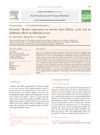15 citations,
March 2015 in “PloS one” Scientists restored fertility in male mice lacking a key fertility gene by using a modified gene.
 277 citations,
July 2002 in “Molecular Endocrinology”
277 citations,
July 2002 in “Molecular Endocrinology” Removing part of the vitamin D receptor stops vitamin D from working properly.
 41 citations,
April 2010 in “Gender Medicine”
41 citations,
April 2010 in “Gender Medicine” The conclusion is that hirsutism should be diagnosed and treated because it affects quality of life and may signal other health problems.
 3 citations,
February 2014 in “Asian Pacific journal of tropical medicine”
3 citations,
February 2014 in “Asian Pacific journal of tropical medicine” Wnt5a may slow down hair growth in mice.
 93 citations,
February 2015 in “Journal of Investigative Dermatology”
93 citations,
February 2015 in “Journal of Investigative Dermatology” Oxidative stress affects hair loss in men with androgenetic alopecia.
55 citations,
October 2019 in “The journal of allergy and clinical immunology/Journal of allergy and clinical immunology/The journal of allergy and clinical immunology” The review suggests that other immune cells besides CD8+ T cells may contribute to alopecia areata and that targeting regulatory cell defects could improve treatment.
28 citations,
January 2017 in “EBioMedicine” Enhancing cannabinoid signaling may help treat skin inflammation.
12 citations,
May 2005 in “Fertility and Sterility” Higher insulin levels are linked to larger ovaries in women with idiopathic hirsutism.
 9 citations,
April 2021 in “Frontiers in Immunology”
9 citations,
April 2021 in “Frontiers in Immunology” Unconventional lymphocytes are important for quick immune responses and healing of skin and mucosal barriers.
 2 citations,
June 2022 in “대한스포츠의학회지”
2 citations,
June 2022 in “대한스포츠의학회지” Anabolic steroids boost muscle growth, SARMs increase muscle mass and bone density without side effects, and myostatin inhibitors block a protein that stops muscle growth, but each has potential risks.
 39 citations,
January 2019 in “The World Journal of Men's Health”
39 citations,
January 2019 in “The World Journal of Men's Health” Testosterone replacement therapy can prevent men from fathering children and should not be used by those wanting to stay fertile.
 January 2023 in “Discovery immunology”
January 2023 in “Discovery immunology” T cells and bacteria in the gut and skin help maintain health and protect against disease.
 July 2023 in “The Egyptian Journal of Hospital Medicine ”
July 2023 in “The Egyptian Journal of Hospital Medicine ” Alopecia areata is a hair loss condition caused by immune factors and can be treated with JAK inhibitors.
 48 citations,
May 2012 in “Journal of Midwifery & Women's Health”
48 citations,
May 2012 in “Journal of Midwifery & Women's Health” Polycystic Ovary Syndrome is common but often undiagnosed, and early treatment is important to prevent health problems.
 40 citations,
November 2009 in “Experimental Dermatology”
40 citations,
November 2009 in “Experimental Dermatology” The mineralocorticoid receptor may play a role in skin and hair health and could be a new target for treating related disorders.
 25 citations,
June 2022 in “Developmental cell”
25 citations,
June 2022 in “Developmental cell” Overactivating Hedgehog signaling makes hair follicle cells in mice grow hair faster and create more follicles.
 169 citations,
August 2004 in “Baillière's best practice & research. Clinical obstetrics & gynaecology/Baillière's best practice and research in clinical obstetrics and gynaecology”
169 citations,
August 2004 in “Baillière's best practice & research. Clinical obstetrics & gynaecology/Baillière's best practice and research in clinical obstetrics and gynaecology” Lower doses of treatments for hirsutism and acne in PCOS are effective and cause fewer side effects.
 191 citations,
May 2018 in “British journal of dermatology/British journal of dermatology, Supplement”
191 citations,
May 2018 in “British journal of dermatology/British journal of dermatology, Supplement” Alopecia areata is likely an autoimmune disease with unclear triggers, involving various immune cells and molecules, and currently has no cure.
 2 citations,
September 2022 in “Frontiers in Immunology”
2 citations,
September 2022 in “Frontiers in Immunology” T-regulatory cells are important for skin health and can affect hair growth and reduce skin inflammation.
 4 citations,
April 2010 in “Expert review of dermatology”
4 citations,
April 2010 in “Expert review of dermatology” Restoring immune privilege in hair follicles could help treat certain types of hair loss.
 10 citations,
November 2018 in “Physiological Research”
10 citations,
November 2018 in “Physiological Research” The conclusion is that standardizing testosterone measurement methods is essential for better diagnosis accuracy in women.
 34 citations,
December 2015 in “Neuroscience & Biobehavioral Reviews”
34 citations,
December 2015 in “Neuroscience & Biobehavioral Reviews” Some hormone-related drugs may protect brain cells in Parkinson's disease differently in men and women.
40 citations,
June 2021 in “Clinical, cosmetic and investigational dermatology” JAK inhibitors show promise in effectively treating hair loss from alopecia areata.
134 citations,
July 2020 in “Experimental dermatology” Hair follicles are normally protected from the immune system, but when this protection fails, it can cause hair loss in alopecia areata.
 6 citations,
January 2021 in “Frontiers in Immunology”
6 citations,
January 2021 in “Frontiers in Immunology” Certain immune cells worsen post-surgery gut paralysis by activating a specific immune response.
 60 citations,
September 2015 in “Expert Review of Clinical Immunology”
60 citations,
September 2015 in “Expert Review of Clinical Immunology” Lymphocytes, especially CD8+ T cells, play a key role in causing alopecia areata, and targeting them may lead to new treatments.
 30 citations,
October 2016 in “Current research in translational medicine”
30 citations,
October 2016 in “Current research in translational medicine” Hair follicles on the scalp interact with and respond to the nervous system, influencing their own behavior and growth.
 29 citations,
May 2020 in “npj Regenerative Medicine”
29 citations,
May 2020 in “npj Regenerative Medicine” Immune cells help regulate hair growth, and better understanding this can improve hair loss treatments.
 12 citations,
April 2019 in “Scientific Reports”
12 citations,
April 2019 in “Scientific Reports” A protein called HMGB1 helps hair grow by affecting prostaglandin metabolism.
14 citations,
May 2017 in “InTech eBooks” Hair is important for protection, social interaction, and temperature control, and is made of a growth cycle-influenced follicle and a complex shaft.






















